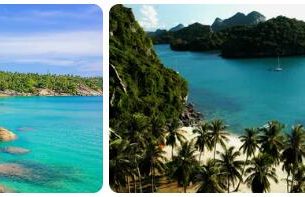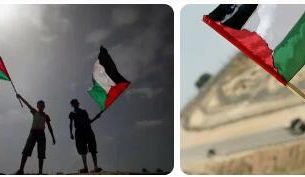Shopping
Overview
Thai silk and cotton fabrics, leather goods, silver, pottery with green celadon glaze, dolls, masks, lacquerware and items made of bamboo and bronze are particularly attractive souvenirs. The weekend market in Bangkok’s Chatuchak Park is a delight to browse and marvel at, selling everything from genuine antiques to fighting fish. Bespoke clothing is also recommended and can be made within a few days. Shopping in Bangkok’s new Inconsiam shopping center is a superlative shopping experience. Alcoholic sale times: Alcoholic beverages are only available in restaurants and shops from 11:00 a.m. to 2:00 p.m. and from 5:00 p.m. to midnight.
- Usprivateschoolsfinder: Offers description downloadable image of national flag for the country of Thailand. Also includes prehistory and history of this nation.
Opening hours
Mon-Sun 10.00/10.30-21.00/22.00.
Nightlife
Introduction
Bangkok’s nightlife is world famous; Nightclubs, pavement cafes, classical dance theaters and cinemas stay open late into the night.
Culinary
Overview
There are both European and Asian restaurants. Thai food is extremely tasty and spicy; however, most restaurants take into account that Europeans are not used to spicy food. Especially pri-kee-noo, small red or green peppers, should be treated with extreme caution by newcomers. These are usually served in a vinaigrette with the main course. Specialties include tom ka (coconut milk soup with macroot leaves, lemon grass, ginger, and chicken or shrimp); Rice with Kaeng Pet (hot “red” curry with coconut milk, herbs, garlic, peppers, crab paste, coriander and other spices); Kaeng Khiaw (“Green” curry with eggplant, beef or chicken); Gai Yang (grilled chicken) and Kao Pat (rice stir-fry with shrimp, chicken and pork, onions, eggs and saffron). These dishes are often served with onions, pickles, soy sauce and peppers. For dessert, salim (sweet noodles in coconut milk) and songkaya (pudding made with coconut milk, egg and sugar, often served in a coconut shell) are particularly recommended. Mangoes with sweet rice (cooked in coconut milk) are also delicious for breakfast, but they are only offered during the mango harvest from March to May. Other exotic fruits include papaya, jackfruit, mangosteens, rambutans, pomelos (sweet grapefruit) and above all durians, which foreigners (known locally as “farangs”) either love or hate because of their peculiar smell. However, one should note that many hotels do not allow durians to be stored in the room. In Thai restaurants you eat with a spoon and fork, in Chinese restaurants with chopsticks or, if you wish, with a knife and fork. In restaurants, hot or cold towelettes are usually given to wipe hands before eating. Drinks: Coconut milk is offered directly from the bowl. Singha beer and Sang Thip whiskey are particularly worth sampling, along with numerous other local drinks. In restaurants, hot or cold towelettes are usually given to wipe hands before eating. Drinks: Coconut milk is offered directly from the bowl. Singha beer and Sang Thip whiskey are particularly worth sampling, along with numerous other local drinks. In restaurants, hot or cold towelettes are usually given to wipe hands before eating. Drinks: Coconut milk is offered directly from the bowl. Singha beer and Sang Thip whiskey are particularly worth sampling, along with numerous other local drinks.
Accommodation
Hotels
Thailand has hotels for every budget. Bangkok in particular has some of the best hotels in Asia; over 12,000 of the hotel rooms meet international standards. All luxury hotels have swimming pool and air conditioning, room service is available 24 hours. Accommodation is cheaper in the Bang’lampoo area. The hotels outside the capital are less luxurious, but extremely affordable. Service and hospitality are very important everywhere. The Hotel Association of Thailand has a hotel reservation desk in almost all airports and can be contacted at the following address: Thai Hotels Association (THA), 203-209/3 Rachadamnoen Klang Avenue, Bawonnivet, Bangkok 10200. Tel: (02) 281 94 96. (www.
Camping
Most campsites are located in national parks managed by the Ministry of Forestry, but there are also campsites in some resort areas. In general, camping is not very common as cheap rooms are available everywhere.
Other accommodation options
YMCA/YWCA (CVJM) hostels and small, inexpensive hotels are available nationwide. For more information, contact Thai Youth Hostels Association, 25/14 Phitsanulok Road, Dusit, Bangkok 10300. Tel: (02) 628 74 13. (www.tyha.org)
Culture
Religion
Theravada Buddhists (94.6%); Christian, Muslim and Hindu minorities.
Social Rules of Conduct
Social etiquette: Traditional customs in Thailand have been exposed to cultural influences from China, India and, more recently, the West for centuries. Western visitors are often greeted by shaking hands, while Thais are greeted in the traditional way, with palms together, fingertips pointing up, and a slight bow. Western visitors should not be afraid to greet Thais in the traditional way. Buddhist monks are always greeted in this way. Close-ups with the camera may not be taken without the consent of the monks. The royal family enjoys boundless respect and their actions are never questioned. Visitors should take this into account and not criticize in any way. In general, Thais are very reserved people and rarely lose their cool. Western visitors should note that only children are allowed to express anger and frustration. An adult who behaves in this way “loses face.” Patience and calm are the order of the day. Shoes are removed before entering a private home or temple. Never point fingers at people or objects or touch Thai people, especially children, on the head. Dress: Casual attire is acceptable everywhere, men are seldom expected to wear a suit. A traditional Thai shirt is men’s best attire for special occasions. Swimwear belongs on the beach “Topless” is not seen with pleasure. Smoking: Smoking is prohibited in Thailand in all enclosed public and air-conditioned spaces such as restaurants, hotels, places of worship, bars, clubs and discos, as well as outdoor markets, parking lots, bus stations, airports, railway stations and many beaches. Smoking is prohibited within a radius of 5 m at the entrances and exits of public buildings. Tipping: A tip of around 10% is expected only in high-class restaurants. In mid-range restaurants, you can round up the bill, but you don’t have to. Taxi drivers do not expect tips. If the service is very friendly, a tip is also appropriate for taxi drivers. Tipping should be given to porters and maids.
Climate
Best travel time
There are three seasons in Thailand: It is hot from March to May/June. Rainy (monsoon) from June/July to September/October. It is cooler from November to February. On the east coast of the southern isthmus the monsoon occurs from November to March, on the west coast (Phuket) from March to October. The hottest temperatures occur in the northwestern plains. For example, towards the end of the hot season, Chiang Mai in northern Thailand can get hotter than Bangkok, albeit with significantly less humidity.
Travel to Thailand can also be undertaken during the rainy season. However, the ideal travel time is from November to February, as the temperatures in the cooler season can still be classified as very warm.
Country data
Phone prefix
+66
Area (sq km)
513,120
Population
69,799,978 (Source: homosociety)
Population density (per square km)
135
Population statistics year
2020
Main emergency number
1155



